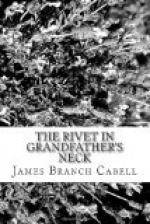“I am sure,” Miss Musgrave remonstrated, with placid dignity, “that you know nothing whatever about her, and that the reports about the earl have probably been greatly exaggerated, and that her picture shows her to be an unusually attractive girl. Though it is true,” Miss Musgrave conceded after reflection, “that there are any number of persons in the House of Lords that I wouldn’t in the least care to have in my own house, even with the front parlor all in linen as it unfortunately is. So awkward when you have company! And the Bible does bid us not to put our trust in princes, and, for my part, I never thought that photographs could be trusted, either.”
“Scorn not the nobly born, Agatha,” her brother admonished her, “nor treat with lofty scorn the well-connected. The very best people are sometimes respectable. And yet,” he pursued, with a slight hiatus of thought, “I should not describe her as precisely an attractive-looking girl. She seems to have a lot of hair,—if it is all her own, which it probably isn’t,—and her nose is apparently straight enough, and I gather she is not absolutely deformed anywhere; but that is all I can conscientiously say in her favor. She is artificial. Her hair, now! It has a—well, you would not call it exactly a crinkle or precisely a wave, but rather somewhere between the two. Yes, I think I should describe it as a ripple. I fancy it must be rather like the reflection of a sunset in—a duck-pond, say, with a faint wind ruffling the water. For I gather that her hair is of some light shade,—induced, I haven’t a doubt, by the liberal use of peroxides. And this ripple, too, Agatha, it stands to reason, must be the result of coercing nature, for I have never seen it in any other woman’s hair. Moreover,” Colonel Musgrave continued, warming somewhat to his subject, “there is a dimple—on the right side of her mouth, immediately above it,—which speaks of the most frivolous tendencies. I dare say it comes and goes when she talks,—winks at you, so to speak, in a manner that must be simply idiotic. That foolish little cleft in her chin, too—”
But at this point, his sister interrupted him.
“I hadn’t a notion,” said she, “that you had even looked at the photograph. And you seem to have it quite by heart, Rudolph,—and some people admire dimples, you know, and, at any rate, her mother had red hair, so Patricia isn’t really responsible. I decided that it would be foolish to use the best mats to-night. We can save them for Sunday supper, because I am only going to have eggs and a little cold meat, and not make company of her.”
For no apparent reason, Rudolph Musgrave flushed.
“I inspected it—quite casually—last night. Please don’t be absurd, Agatha! If we were threatened with any other direful visitation —influenza, say, or the seventeen-year locust,—I should naturally read up on the subject in order to know what to expect. And since Providence has seen fit to send us a visitor rather than a visitation—though, personally, I should infinitely prefer the influenza, as interfering in less degree with my comfort,—I have, of course, neglected no opportunity of finding out what we may reasonably look forward to. I fear the worst, Agatha. For I repeat, the girl’s face is, to me, absolutely unattractive!”




